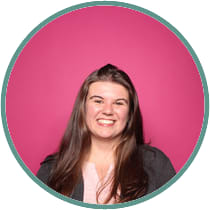Common Interview Questions and Answers (With Examples)
This is it: The make-it-or-break-it interview stage.
The interview is the hardest part of the job process, but we’re here to help. To identify common job interview questions to prepare for, we reached out to Editorial Director Erica Devaney. Devaney has conducted hundreds of interviews, making her uniquely qualified to provide advice and insight about the interview process.

Hi, y’all. My name is Erica Devaney.
I’ve been at Red Ventures for nine years, working on various teams in a few different content roles — from SEO writing, to UX content, to editorial planning, and more. In 2019, I did more creative interviews than anyone else at the company, so I’d say I have some experience here. I hope some of my interview tips can be helpful to you!
Interviews are crucial to finding the right person for the right role. At Red Ventures, we use interviews to make sure a candidate is a good fit for the specific role, which includes having the right skills, the right attitude for coaching, and an eagerness to learn.
Common Interview Questions
Every interview — and every candidate — is different, but I generally rely on a central set of questions to help me better understand the question. Here are five of my go-to interview questions.
I typically interview candidates for content or design roles, so I’ve shared a few creative-specific questions along with more generic versions of those questions to help those of you interviewing in other industries. To help advance you through the hiring process, I’ll also clue you in to what I’m looking for when I ask these questions and provide a sample response that I’d like to hear.
Interview FAQ
Here’s advice for some common interview scenarios.
Any Tips for Interviewing Successfully on Zoom?
Zoom interviews are our current reality and we’ve all had to adapt. The most important thing to remember is that we’re all in the same situation — most everyone is now holding their meetings over Zoom, and interviews are no different for me as an interviewer.
We all have pets and kids and roommates or partners who may end up in the background of a Zoom meeting, and that’s okay! We all get it. It is guaranteed that one of my two cats will walk across my screen or end up in the background of a meeting at least once a day, and interviews are not exempt from these visits.
On a more practical note, I’d suggest testing your Zoom before your interview. This includes making sure you know how to log in and use your camera, testing out your audio, and ensuring you have your headphones handy.
If you happen to have a shaky or unstable internet connection on the day of your interview, don’t worry — we’ve all been there before, too. In some cases where someone has a shaky connection, I’ll often suggest we both turn off our cameras and just talk, because that typically helps keep the audio from freezing.
Additional Commonly-Asked Interview Questions
- What interests you about this position?
- What are your greatest strengths and biggest weaknesses?
- What types of people do you have difficulty working with?
- What distinguishes you from other people who can do the same tasks as you?
- What role do you usually play in a group?
- What tools do you use to stay organized?
- What’s something about you that people wouldn’t know from your resume?
- What question were you hoping I’d ask today, but didn’t — and what would your answer be?
- What aspect of your current role do you enjoy doing most?
- What questions do you have for me?
Header Image Credits: Compassionate Eye Foundation/Gary Burchell, Luis Alvarez | Getty Images




